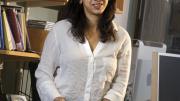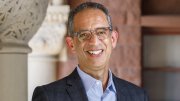You become interested in things you’ve seen a lot of, says Rohini Pande; for her—growing up in India—issues of poverty and gender were “first-order.” The Kamal professor of public policy witnessed protests demanding more women political candidates during her studies at Delhi University; they triggered questions about representation and inequality that still dominate her work. She uses economic approaches to study the design of democratic institutions and regulatory structures, seeking to measure the effect of initiatives like voter information campaigns, microfinance, and market-based mechanisms for environmental regulation. She has found, for instance, that gender quotas in village councils raise local girls’ career aspirations and educational progress. Outside work, she says, “I spend a lot of time climbing, badly.” Her family (her mother is a journalist, her father a public administrator, and her sister a doctor) is from the Lower Himalayas, and Pande began climbing—“more like snow-plodding”—as a child; a recent climb had her clinging to the sea cliffs of Cornwall. She is no stranger to England: the Rhodes Scholar earned a master’s at Oxford and a Ph.D. from the London School of Economics; she arrived at Harvard from Yale in 2006. She returns often to India to conduct field experiments, gathering evidence to shape policy design and implementation as part of the Evidence for Policy Design initiative she co-founded in 2008. The “craft” of a good field experiment, she says, lies in isolating specific effects that speak generally to human behavior. From policies to regulations to elections, “I’m curious to look for explanations that help link the design of a policy to its subsequent impact.”
Harvard economist Rohini Pande assesses the impact of public policies
Harvard economist Rohini Pande assesses the impact of public policies
Economist Rohini Pande assesses the impact of public policies.

You might also like
The School of Public Health, Facing a Financial Reckoning, Seizes the Chance to Reinvent Itself
Dean Andrea Baccarelli plans for a smaller, more impactful Chan School of 2030.
Harvard Kennedy School Unveils American Service Fellowship
Will fund degrees for 50 public servants and military veterans
John Goldberg named Dean of Harvard Law School
A professor at HLS since 2008, he steps up from the interim role.
Most popular
Explore More From Current Issue

On Weekends, These Harvard Math Professors Teach the Smaller Set
At Cambridge Math Circle, faculty and alumni share puzzles, riddles, and joy.

A Forgotten Harvard Anthem
Published the year the Titanic sank, “Harvard’s Best” is a quizzical ode to the University.

Harvard’s Financial Challenges Lead to Difficult Choices
The University faces the consequences of the Trump administration—and its own bureaucracy.





